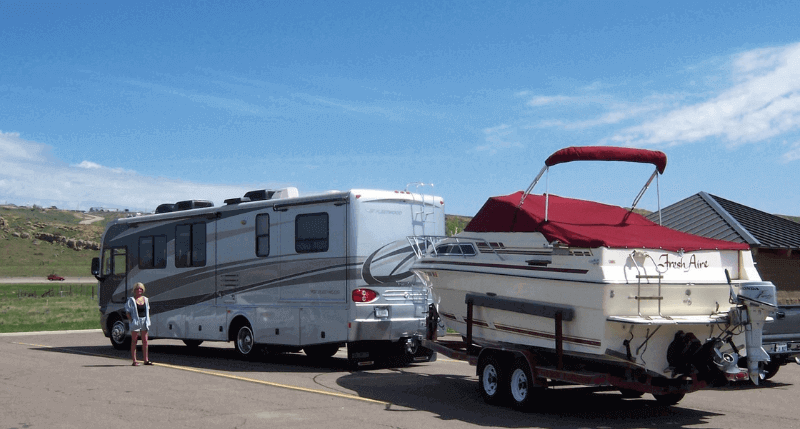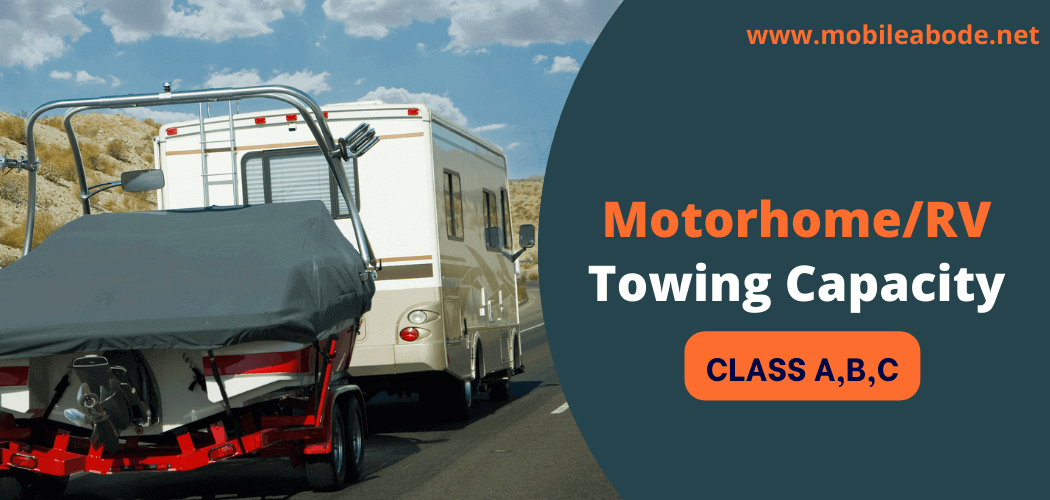What is the towing capacity for a motorhome? This is an important question that buyers need to ask themselves before they make their purchase. The answer depends on the make and model of a motorhome, as well as the weight of the trailer or towed object.
Here’s How Much Can Motorhomes Tow?
Most motorhomes can tow between 5,000 and 10,000 pounds. So if you’re looking to haul a boat or trailer with your new motorhome, be sure to check its towing capacity before making your purchase.
Some of the factors that will affect a motorhome’s towing capacity include the make and model of the motorhome, as well as the weight of the trailer or towed object.
When shopping for a new motorhome, be sure to keep its towing capacity in mind. If you’re planning on hauling a boat or trailer with your new RV, be sure to check the towing capacity before making your purchase. With a little bit of research, you can find the perfect motorhome for your needs.
Motorhome Towing Capacity By Categories
1- Class A Motorhome Towing Capabilities
Class A motorhomes are the largest and most expensive type of RV. They can range in length from 25 feet to 45 feet, and they typically weigh between 12,000 and 30,000 pounds. Most Class A motorhomes can tow between 5,000 and 10,000 pounds.
2- Class B Motorhome Towing Capabilities
Class B motorhomes are the smallest and most affordable type of RV. They typically range in length from 18 feet to 25 feet, and they typically weigh between 6,000 and 12,000 pounds. Most Class B motorhomes can tow between 2,500 and 5,000 pounds.
3- Class C Motorhome Towing Capabilities
Class C motorhomes are larger than Class B motorhomes, but they’re smaller than Class A motorhomes. They typically range in length from 25 feet to 35 feet, and they typically weigh between 10,000 and 20,000 pounds. Most Class C motorhomes can tow between 5,000 and 10,000 pounds.
Now that you know the towing capacity for each type of motorhome, you can decide which one is right for you. If you’re planning on hauling a large trailer or boat, you’ll need to purchase a Class A, B, or C motorhome. But if you don’t plan on hauling anything heavy, a Class B or C motorhome should suffice.
Related Topic: How To Level a Class C Motorhome?
Are Motorhomes Best For Towing?

If you’re looking for a motorhome that’s great for towing, there are a few things to keep in mind.
- You’ll need to decide which type of motorhome is right for you. Class A, B, and C motorhomes all have different towing capacities, so be sure to choose one that can tow the weight of your trailer or boat.
- You’ll need to consider the weight of the trailer or boat that you’ll be hauling. The heavier the object, the more power you’ll need to tow it. So if you’re planning on hauling a large trailer or boat, be sure to choose a motorhome with a high towing capacity.
- Finally, you’ll need to decide what features you want in a motorhome. Some motorhomes come with features that make towing easier, such as tow hitches and trailer brakes. If you plan on doing a lot of towing, be sure to choose a motorhome that has the features you need.
With a little bit of research, you can find the perfect motorhome for your needs. Be sure to consider the towing capacity, weight, and features of each motorhome before making your purchase. With the right motorhome, you’ll be able to tow your trailer or boat with ease.
How to Calculate the Weight of your Towed Vehicle?
The weight of your towed vehicle will affect the towing capacity of your motorhome. To calculate the weight of your towed vehicle, you’ll need to know the curb weight and the dry weight of the vehicle.
- Curb weight is the weight of the vehicle with all of its fluids and a full tank of gas.
- Dry weight is the weight of the vehicle without any fluids or gas. To calculate the weight of your towed vehicle, you’ll need to add the curb weight and the dry weight together.
For example, let’s say that you have a car that has a curb weight of 3,000 pounds and a dry weight of 2,500 pounds. To calculate the weight of your towed vehicle, you would add the curb weight and the dry weight together to get a total weight of 5,500 pounds.
Keep in mind that the weight of your vehicle will affect the towing capacity of your motorhome. Be sure to calculate the weight of your towed vehicle before choosing a motorhome.
Safety Tips For Towing Vehicle
There are a few safety tips that you should keep in mind when towing a vehicle. First, be sure to use the proper tow hitch and ball mount for your vehicle. Second, be sure to use the proper towing technique. And finally, be sure to use safety chains when towing a vehicle.
- Use the proper tow hitch and ball mount for your vehicle.
- Use the proper towing technique.
- Use safety chains when towing a vehicle.
By following these safety tips, you can help ensure that your towing experience is safe and successful.
Problems Associated With Towing Car Behind A Motorhome:
There are a few common problems that can occur when towing a car behind a motorhome.
- The tow hitch can become detached from the motorhome.
- The tow bar can break.
- Finally, the brakes on the towed vehicle can fail.
If you’re having trouble with your towing setup, be sure to check the tow hitch, tow bar, and brakes on the towed vehicle. By checking these components, you can help prevent common problems from occurring.
Tips For Troubleshooting Towing Problems:
If you’re having trouble with your towing setup, there are a few things you can do to troubleshoot the problem.
- First, be sure to check the tow hitch, tow bar, and brakes on the towed vehicle.
- Next, be sure to check the towing capacity of your motorhome.
- Finally, be sure to use safety chains when towing a vehicle.
By following these troubleshooting tips, you can help identify and fix the problem.
Also Read: How To Use Inverter In Motorhome?
FAQs – RV Towing Capacity
Does towing a car behind an RV damage it?
Towing a car behind an RV can damage the car if it’s not done properly. Be sure to use the proper tow hitch and ball mount for your vehicle. Also, be sure to use the proper towing technique and safety chains when towing a vehicle. By following these tips, you can help prevent damage to your car.
Can you reverse when flat towing?
You should not reverse when flat towing a vehicle. Reversing can damage the towed vehicle and the tow bar. If you need to back up, be sure to disconnect the tow bar from the vehicle. Then, you can use your motorhome to push the vehicle backward.
Is it legal to tow a car behind a motorhome?
In most states, it is legal to tow a car behind a motorhome. However, there may be some restrictions in your state. Be sure to check the laws in your state before you begin towing a vehicle.
How do I increase the towing capacity of my motorhome?
There are a few ways you can increase the towing capacity of your motorhome.
- Upgrade the suspension on your motorhome.
- Then, you can install a heavier-duty transmission cooler.
- Finally, you can install a larger engine in your motorhome.
By upgrading these components, you can help increase the towing capacity of your motorhome.
What happens if you exceed two capacities?
If you exceed the towing capacity of your motorhome, you can damage the engine, transmission, and suspension. You may also have difficulty stopping the vehicle. Be sure to check the towing capacity of your motorhome before you begin towing a vehicle.
Wrap Up
Motorhomes can tow a variety of trailers, boats, and other recreational vehicles. How much your motorhome can tow depends on the weight of the vehicle and the towing capacity of the hitch.
Be sure to consult your owner’s manual or contact your dealer for more information about towing capacity before you hit the open road. With a little preparation and planning, you can safely tow whatever recreational vehicle strikes your fancy behind your shiny new motorhome.

